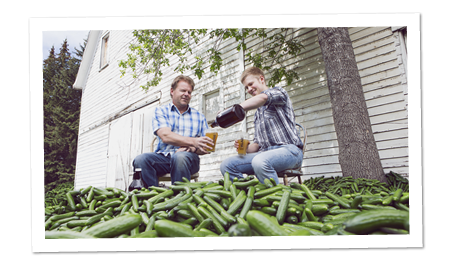Calgary chefs offer their tips for keeping it fresh in Calgary
For chefs aiming to cook local in Alberta, this time of year is a challenge. With weeks to go before spring vegetables (asparagus, radishes, spinach) ‘shoot’ from their seeds and the last of the 2013 stock of root vegetables (beets, carrots, turnips, onions) drying up, it’s not uncommon to feel the itch to give up the cause. But fear not! Sustainable foodies can stay happy thanks to inventive Alberta farmers – if they know where to look. We did our supplier research and asked some of Calgary’s top chefs for their tips for surviving the pre-springtime ingredient challenge.
Chef Dan Labutes (Chef’s Table, Kensington Riverside Inn): “I try to work with local people who have good storage systems for their root vegetables so that in March I can still get the same quality of potatoes and carrots as I did in November. Otherwise I work with importers who get me products that have to travel as short of a distance as possible.”
The Cucumber Man, photo credit The Calgary Herald: “The Cucumber Man (locations the Kingsland Farmers’ Market and Calgary Farmers’ Market) produces year-round produce from its Alberta greenhouse, and sometimes will import veggies (non-GMO, pesticide and herbicide free) from Canadian farmers with operations in other countries.”
Chef Jamie Harling (Rouge Restaurant): “Trying to be a sustainable local restaurant in Alberta is a challenging thing to do. Luckily many Alberta producers have access to greenhouses that extend the growing season by many months. The important thing is trying to preserve Alberta products through the spring, summer, and fall and save for the long winter months. Practices such as fermentation, pickling and canning are a great way to keep ingredients available throughout the year.”
Chef Andrew Winfield (River Cafe): ““Each year around this time we put our money where our mouth is and present a ‘Roots & Shoots’ collaborative dinner. We bridge the late-winter to early-spring season by sourcing from our nearby neighbours in British Columbia where spring comes a little earlier. We also like to use lesser known first of spring foraged edibles like stinging nettle on our menu. One of my top tips for ingredient hunters is to check out Fifth Element in the Crossroads Farmers’ Market. They supply lots of unique products from truffles to wild fiddleheads, ramps and nettles.”
Read more: http://river-cafe.com/blog/april_2014/toughest_time_to_cook_local/
